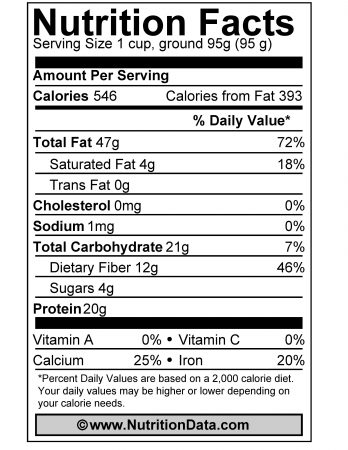
Noted for being one of the top nutritional nuts, almonds are the perfect choice for a light snack. With the low calorie content of almonds, it is possible to incorporate these tasty nuts into your regular diet. To bypass any concerns, we will examine the almond’s health benefits and an important question as to how many calories in almonds.
The almond, as we know it, is actually the seed of the almond fruit that grows on trees, similar to the peach and cherry trees. Although we are able to access almonds year-round, summer is the peak season in their native lands of the Middle East, North Africa, and Southern Asia.
The almond tree was introduced over time to Spain, Portugal, Italy, Morocco, and California—the only state in the U.S. that produces almonds.
How many Calories in Almonds
| Types of Almonds | Calorie Count |
|---|---|
| Raw Almond | 164 Calories |
| Roasted Almond (Without Salt) | 168 Calories |
| Roasted Almond (With Salt) | 169 Calories |
| Soaked Almond | 161 Calories |
While various health diets call for the easy-to-grab snack, there are some people that say almonds are too high in fat to enjoy. Like all tree nuts with fat content, it is important to understand the calorie component of different serving sizes.
One raw almond, or kernel, has seven calories—five of which are from fat content—the good-for-you monounsaturated fat. Most diets advise to eat a handful of almonds in between meals. If the delicious, sweet taste leaves you wanting more, don’t panic. One ounce, about 23 almonds, has only 164 calories, and of the 129 calories in the fat content, only 1.1 grams are saturated fat.
Now let’s take a look at the almond’s nutrition facts to justify the high-fat content.
Nutritional Facts of Almonds
These little nuts are packed with essential nutrients such as vitamin E, copper, manganese, biotin, magnesium, molybdenum, phosphorus, and riboflavin (also known as vitamin B2).
Almonds have a significant amount of fiber as well. They contain 3.5 grams of fibre, which is 13% of your recommended daily intake in one ounce of nuts.
Credit: “Nutritional data and images courtesy of www.NutritionData.com.”
11 Health Benefits of Almonds
1. Brain Power
Two important nutrients for brain development and growth are riboflavin and L-carnitine, both of which are found in high amounts in almonds.
2. Healthy Heart
The high amount of monounsaturated fats in almonds have been found to reduce the risk of heart disease. As the magnesium helps to avoid heart attacks, the vitamin E is a powerful antioxidant. The folic acid within the almonds fights against the cause of plaque buildup in the arteries.
3. Blood Pressure Regulation
A key blood pressure regulator, potassium, can be found in almonds. They are also low in sodium, so the level of blood pressure is better managed.
4. Inflammation Reducer
Essential fatty acids that are needed from dietary sources, linoleic and linolenic acids, are found in almonds.
5. Energy Source
Almonds are one of the best food choices for boosting both your metabolic rate and energy, thanks to the copper, riboflavin, and manganese components.
6. Immune System Booster
Overall good health relies on a strong immune system, which can be strengthened with adding almonds to your diet. This is due, in part, to the alkali sources within almonds.
7. Cholesterol Stabilizer
Control your cholesterol levels by incorporating almonds into your regular diet. They help to increase the good, high-density lipoproteins (HDL), as well as decrease the low-density lipoproteins (LDL).
8. Maintains Strong Bones
Your bones and teeth depend on nutrients such as phosphorous to stay healthy and strong. With such a high amount found in almonds, it can help prevent diseases such as osteoporosis.
9. Lowers Colon Cancer Risk
The high fiber content in almonds works with your internal system to flush out toxins and prevent build-up.
10. Diabetes Protector
To help prevent the disease, eating almonds can regulate glucose absorption and the creation process.
11. Reduces Weight – Despite the high fat content, almonds help to suppress your appetite, give you the feeling of fullness, and promote bowel movements with their high-fiber content.
How Many Almonds to Eat per Day?
With all of the health benefits of eating almonds, is there such a thing as too much? Yes. It turns out that eating too many almonds in one day can lead to discomfort, pain, and even serious health problems.
It is recommended to eat one ounce, or 23 almonds per day, to maintain good health. Too many at once can result in gastrointestinal issues such as cramps, constipation, and bloating. In the long term, you can suffer from weight gain by not burning off the fat content.
More serious issues can arise as the level of manganese can be triggered into the high stages with the use of medications such as antipsychotics, antibiotics, and blood pressure pills. Even over-the-counter drugs such as antacids and laxatives have significant levels of manganese. The risk of overdosing on vitamin E is an increased risk with consuming too many almonds.
How to Eat Almonds
It may sound silly, but to be able to get the most out of the health benefits, you should be aware of the dos and don’ts of eating almonds. One way to get the most nutrients without the pain-causing enzyme inhibitor found in the brown skin of raw almonds is to soak them overnight in cold water. This allows better digestion of the nut.
It is also good to eat almonds on an empty stomach to ensure you are getting all of the nutrients. Some people find it helpful to drink water with the almonds as well. While you may grab a handful to tame your hunger pains, almonds are also great in salads or as toppings in casseroles.
So, go ahead and dig in to a healthy serving of almonds to balance your nutritional needs. Whether you are supplementing your dietary needs, trying to lose weight, or just simply maintaining good overall health, almonds are the perfect choice. Packed with protein, fiber, and an abundance of vitamins and minerals, this little nut will have you feeling and looking your best.
Related:
Sources:
“How Many Calories in Almonds, Raw,” Calorie King web site; http://www.calorieking.com/foods/calories-in-nuts-almonds-raw_f-ZmlkPTYyNDEx.html, last accessed January 11, 2017.
“Almonds,” The World’s Healthiest Foods web site; http://www.whfoods.com/genpage.php?tname=foodspice&dbid=20#nutritionalprofile, last accessed January 11, 2017.














